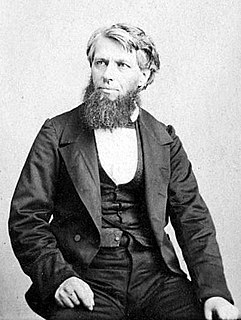A Quote by Ralph Moody
A man's character is like his house. If he tears boards off his house and burns them to keep himself warm and comfortable, his house soon becomes a ruin. If he tells lies to be able to do the things he shouldn't do but wants to, his character will soon become a ruin. A man with a ruined character is a shame on the face of the earth.
Related Quotes
A man is known by the books he reads, by the company he keeps, by the praise he gives, by his dress, by his tastes, by his distastes, by the stories he tells, by his gait, by the notion of his eye, by the look of his house, of his chamber; for nothing on earth is solitary but every thing hath affinities infinite.
Man's chief difference from the brutes lies in the exuberant excess of his subjective propensities his preeminence over them simply and solely in the number and in the fantastic and unnecessary character of his wants, physical, moral, aesthetic, and intellectual. Had his whole life not been a quest for the superfluous, he would never have established himself as inexpugnably as he has done in the necessary.
[Man] is the only animal who lives outside of himself, whose drive is in external things—property, houses, money, concepts of power. He lives in his cities and his factories, in his business and job and art. But having projected himself into these external complexities, he is them. His house, his automobile are a part of him and a large part of him. This is beautifully demonstrated by a thing doctors know—that when a man loses his possessions a very common result is sexual impotence.
We're all so clogged with dead ideas passed from generation to generation that even the best of us don't know the way out We invented the Revolution but we don't know how to run it Look everyone wants to keep something from the past a souvenir of the old regime This man decides to keep a painting This one keeps his mistress He [ pointing ] keeps his garden He [ pointing ] keeps his estate He keeps his country house He keeps his factories This man couldn't part with his shipyards This one kept his army and that one keeps his king
Man in his raw, natural state as he comes from the womb is morally and spiritually corrupt in disposition and character. Every part of his being-his mind, his will, his emotions, his affections, his conscience, his body-has been affected by sin (this is what is meant by the doctrine of total depravity)
A man who has been born into the house of a warrior and yet places no loyalty in his heart and thinks only of the fortune of his position will be flattering on the surface and construct schemes in his heart, will forsake righteousness and not reflect on his shame, and will stain the warrior's name of his household to later generations. This is truly regrettable.
Expeditions can greatly contribute towards building strength of character. Joseph Conrad in Lord Jim tells us that it is necessary for a youth to experience events which 'reveal the inner worth of the man; the edge of his temper; the fibre of his stuff; the quality of his resistance; the secret truth of his pretences, not only to himself but others.



































